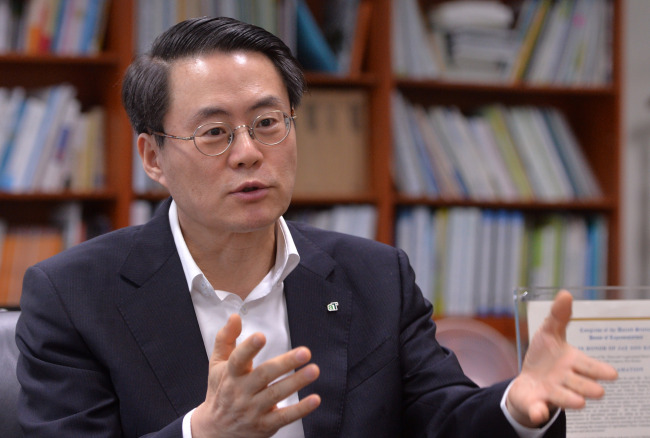[Herald Interview] ‘Free trade pact with China could be boon for food exports’
State-run food trade agency leads hansik globalization
By Korea HeraldPublished : July 22, 2014 - 21:04
South Korea and China are now in the final steps of signing a bilateral free trade agreement in a move triggering concerns among local farmers of the possible havoc that low-cost, mass-produced Chinese products may wreak on the local agricultural sector.
But a senior agriculture industry official believes the FTA deal with Asia’s biggest economy will not be without substantial export opportunities.
“China is already our most important market for farm produce and agro-processed foods. The free trade agreement with the country with almost 1.4 billion people presents many opportunities for our food exports,” Kim Jae-soo, president and CEO of Korea Agro-Fisheries and Food Trade Corp., said in a recent interview with The Korea Herald.
But a senior agriculture industry official believes the FTA deal with Asia’s biggest economy will not be without substantial export opportunities.
“China is already our most important market for farm produce and agro-processed foods. The free trade agreement with the country with almost 1.4 billion people presents many opportunities for our food exports,” Kim Jae-soo, president and CEO of Korea Agro-Fisheries and Food Trade Corp., said in a recent interview with The Korea Herald.

According to the state-run food trade agency, also known as aT, South Korea exported about $1.3 billion worth of agro-food products to China in 2013. The figure reflects a 130 percent increase from the $565 million in 2009.
“Korean products are well received for their high quality and safety requirements, so we expect a steady increase in food exports to China,” Kim said.
He added that when the FTA takes effect, South Korea can import Chinese farm produce and reprocess it for export to other countries.
“We can benefit from using our advanced food processing techniques and facilities to increase food exports,” he added.
But to increase the volume and variety of food exports, he said the local food industry must improve its global competiveness.
In particular, the CEO said more investment from big conglomerates in the local food-processing business was necessary, noting that smaller, independently run food companies currently account for almost 90 percent of the total investment in the local agro-food industry.
Established in 1967, the state-run agency provides support for local food companies and farmers to export their products, and controls distribution of rice and vegetables.
To support overseas market development, aT operates overseas branches in 10 cities, including Tokyo, Beijing, Jakarta, Hong Kong, New York and Paris.
Also, as part of its efforts to create an export base, the state-run organization regularly holds promotional events, such as K-food festivals, in and outside of the country, the CEO explained.
Kim joined the Agriculture Ministry in 1997. He served as a deputy minister for the ministry from 2010 until taking the helm of the state-run agriculture agency at the end of 2011.
Having spent three decades working to improve the agriculture sector, Kim, 57, now has a self-imposed mission: to put Korean cuisine, or hansik, on the list of the world’s best food.
Thanks largely to the increasing popularity of Korean pop music and TV dramas, more people around the globe now appreciate hansik, he said.
“But if we want to make it a truly global food, we will need support from the government, business and the public.”
“Hansik globalization should be a national priority,” he added.
By Oh Kyu-wook (596story@heraldcorp.com)
-
Articles by Korea Herald








![[Kim Seong-kon] Democracy and the future of South Korea](http://res.heraldm.com/phpwas/restmb_idxmake.php?idx=644&simg=/content/image/2024/04/16/20240416050802_0.jpg&u=)








![[KH Explains] Hyundai's full hybrid edge to pay off amid slow transition to pure EVs](http://res.heraldm.com/phpwas/restmb_idxmake.php?idx=652&simg=/content/image/2024/04/18/20240418050645_0.jpg&u=20240418181020)

![[Today’s K-pop] Zico drops snippet of collaboration with Jennie](http://res.heraldm.com/phpwas/restmb_idxmake.php?idx=642&simg=/content/image/2024/04/18/20240418050702_0.jpg&u=)